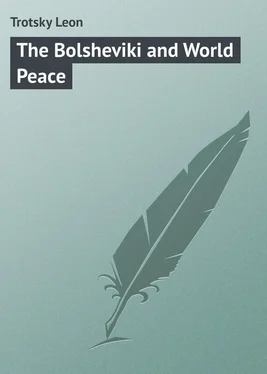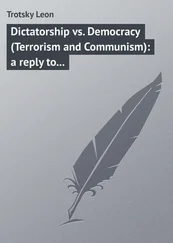Leon Trotsky - The Bolsheviki and World Peace
Здесь есть возможность читать онлайн «Leon Trotsky - The Bolsheviki and World Peace» — ознакомительный отрывок электронной книги совершенно бесплатно, а после прочтения отрывка купить полную версию. В некоторых случаях можно слушать аудио, скачать через торрент в формате fb2 и присутствует краткое содержание. ISBN: , Жанр: foreign_language, Русская классическая проза, на английском языке. Описание произведения, (предисловие) а так же отзывы посетителей доступны на портале библиотеки ЛибКат.
- Название:The Bolsheviki and World Peace
- Автор:
- Жанр:
- Год:неизвестен
- ISBN:http://www.gutenberg.org/ebooks/40273
- Рейтинг книги:4 / 5. Голосов: 1
-
Избранное:Добавить в избранное
- Отзывы:
-
Ваша оценка:
- 80
- 1
- 2
- 3
- 4
- 5
The Bolsheviki and World Peace: краткое содержание, описание и аннотация
Предлагаем к чтению аннотацию, описание, краткое содержание или предисловие (зависит от того, что написал сам автор книги «The Bolsheviki and World Peace»). Если вы не нашли необходимую информацию о книге — напишите в комментариях, мы постараемся отыскать её.
The Bolsheviki and World Peace — читать онлайн ознакомительный отрывок
Ниже представлен текст книги, разбитый по страницам. Система сохранения места последней прочитанной страницы, позволяет с удобством читать онлайн бесплатно книгу «The Bolsheviki and World Peace», без необходимости каждый раз заново искать на чём Вы остановились. Поставьте закладку, и сможете в любой момент перейти на страницу, на которой закончили чтение.
Интервал:
Закладка:
Yet in the present epoch it is quite impossible to treat these questions in and by themselves. They are utterly devoid of an independent character. The creation of normal relations of national life and economic development on the Balkan Peninsula is unthinkable if Czarism and Austria-Hungary are preserved. Czarism is now the indispensable military reservoir for the financial imperialism of France and the conservative colonial power of England. Austria-Hungary is the mainstay of Germany's imperialism. Issuing from the private family clashes between the national Servian terrorists and the Hapsburg political police, the War very quickly revealed its true fundamental character-a struggle of life and death between Germany and England. While the simpletons and hypocrites prate of the defense of national freedom and independence, the German-English War is really being waged for the freedom of the imperialistic exploitation of the peoples of India and Egypt on the one hand, and for the imperialistic division of the peoples of the earth on the other.
Germany began its capitalistic development on a national basis with the destruction of the continental hegemony of France in the year 1870-1871. Now that the development of German industry on a national foundation has transformed Germany into the first capitalistic power of the world, she finds herself colliding with the hegemony of England in her further course of development. The complete and unlimited domination of the European continent seems to Germany the indispensable prerequisite of the overthrow of her world enemy. The first thing, therefore, that imperialistic Germany writes in her programme is the creation of a Middle European League of Nations. Germany, Austria-Hungary, the Balkan Peninsula and Turkey, Holland, the Scandinavian countries, Switzerland, Italy, and, if possible, enfeebled France and Spain and Portugal, are to make one economic and military whole, a Great Germany under the hegemony of the present German state.
This programme, which has been thoroughly elaborated by the economists, political students, jurists and diplomats of German imperialism and translated into reality by its strategists, is the most striking proof and most eloquent expression of the fact that capitalism has expanded beyond the limits of the national state and feels intolerably cramped within its boundaries. The national Great Power must go and in its place must step the imperialistic World Power.
In these historical circumstances the working class, the proletariat, can have no interest in defending the outlived and antiquated national "fatherland," which has become the main obstacle to economic development. The task of the proletariat is to create a far more powerful fatherland, with far greater power of resistance- the republican United States of Europe , as the foundation of the United States of the World.
The only way in which the proletariat can meet the imperialistic perplexity of capitalism is by opposing to it as a practical programme of the day the Socialist organization of world economy.
War is the method by which capitalism, at the climax of its development, seeks to solve its insoluble contradictions. To this method the proletariat must oppose its own method, the method of the Social Revolution.
The Balkan question and the question of the overthrow of Czarism, propounded to us by the Europe of yesterday, can be solved only in a revolutionary way, in connection with the problem of the United Europe of to-morrow. The immediate, urgent task of the Russian Social Democracy, to which the author belongs, is the fight against Czarism. What Czarism primarily seeks in Austria-Hungary and the Balkans is a market for its political methods of plunder, robbery and acts of violence. The Russian bourgeoisie all the way up to its radical intellectuals has become completely demoralized by the tremendous growth of industry in the last five years, and it has entered into a bloody league with the dynasty, which had to secure to the impatient Russian capitalists their part of the world's booty by new land robberies. While Czarism stormed and devastated Galicia, and deprived it even of the rags and tatters of liberty granted to it by the Hapsburgs, while it dismembered unhappy Persia, and from the corner of the Bosporus strove to throw the noose around the neck of the Balkan peoples, it left to the liberalism which it despised the task of concealing its robbery by sickening declamations over the defense of Belgium and France. The year 1914 spells the complete bankruptcy of Russian liberalism, and makes the Russian proletariat the sole champion of the war of liberation. It makes the Russian Revolution definitely an integral part of the Social Revolution of the European proletariat.
In our war against Czarism, in which we have never known a "national" truce, we have never looked for help from Hapsburg or Hohenzollern militarism, and we are not looking for it now. We have preserved a sufficiently clear revolutionary vision to know that the idea of destroying Czarism was utterly repugnant to German imperialism. Czarism has been its best ally on the Eastern border. It is united to it by close ties of social structure and historical aims. Yet even if it were otherwise, even if it could be assumed that, in obedience to the logic of military operations, it would deal a destructive blow to Czarism, in defiance of the logic of its own political interests-even in such a highly improbable case we should refuse to regard the Hohenzollerns not only as an objective but as a subjective ally. The fate of the Russian Revolution is so inseparably bound up with the fate of European Socialism, and we Russian Socialists stand so firmly on the ground of internationalism, that we cannot, we must not for a moment, entertain the idea of purchasing the doubtful liberation of Russia by the certain destruction of the liberty of Belgium and France, and-what is more important still-thereby inoculating the German and Austrian proletariat with the virus of imperialism.
We are united by many ties to the German Social Democracy. We have all gone through the German Socialist school, and learned lessons from its successes as well as from its failures. The German Social Democracy was to us not only a party of the International. It was the Party par excellence . We have always preserved and fortified the fraternal bond that united us with the Austrian Social Democracy. On the other hand, we have always taken pride in the fact that we have made our modest contribution towards winning suffrage in Austria and arousing revolutionary tendencies in the German working class. It cost more than one drop of blood to do it. We have unhesitatingly accepted moral and material support from our older brother who fought for the same ends as we on the other side of our Western border.
Yet it is just because of this respect for the past, and still more out of respect for the future, which ought to unite the working class of Russia with the working classes of Germany and Austria, that we indignantly reject the "liberating" aid which German imperialism offers us in a Krupp munition box, with the blessing, alas! of German Socialism. And we hope that the indignant protest of Russian Socialism will be loud enough to be heard in Berlin and in Vienna.
The collapse of the Second International is a tragic fact, and it were blindness or cowardice to close one's eyes to it. The position taken by the French and by the larger part of English Socialism is as much a part of this breakdown as the position of the German and Austrian Social Democracy. If the present work addresses itself chiefly to the German Social Democracy it is only because the German party was the strongest, most influential, and in principle the most basic member of the Socialist world. Its historic capitulation reveals most clearly the causes of the downfall of the Second International. At first glance it may appear that the social revolutionary prospects of the future are wholly deceptive. The insolvency of the old Socialist parties has become catastrophically apparent. Why should we have faith in the future of the Socialist movement? Such skepticism, though natural, nevertheless leads to quite an erroneous conclusion. It leaves out of account the good will of history, just as we have often been too prone to ignore its ill will, which has now so cruelly shown itself in the fate that has overcome the International.
Читать дальшеИнтервал:
Закладка:
Похожие книги на «The Bolsheviki and World Peace»
Представляем Вашему вниманию похожие книги на «The Bolsheviki and World Peace» списком для выбора. Мы отобрали схожую по названию и смыслу литературу в надежде предоставить читателям больше вариантов отыскать новые, интересные, ещё непрочитанные произведения.
Обсуждение, отзывы о книге «The Bolsheviki and World Peace» и просто собственные мнения читателей. Оставьте ваши комментарии, напишите, что Вы думаете о произведении, его смысле или главных героях. Укажите что конкретно понравилось, а что нет, и почему Вы так считаете.











